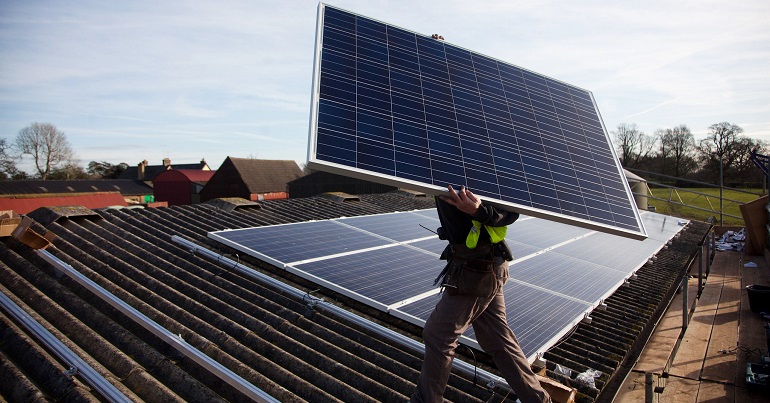What solar power needs from a General Election

It’s likely a General Election is just around the corner. Boris Johnson’s government hangs by a thread; if we get a no-deal Brexit then Johnson will surely go to the public riding on his success. “Either way,” says the Economist, “a vote is coming.”
An election is a great opportunity to sort out the UK’s solar market. Indeed, Government has a long history supporting various energy technologies. They do this via policy incentives: North Sea oil, for example, receives £24bn in various tax breaks.
So: what could a new government do for UK solar?
1. Get rid of VAT on solar panels
For the past seven years, VAT on solar panels was charged at 5% (the rate applied to ‘energy saving materials’). That changed this year with an increase in VAT on new solar systems to 20%.
Given that the amount of VAT raised through solar panel sales is trivial, this was plainly a political (rather than financial) move. And it’s equally plain that it’s the opposite direction we need to travel.
Removing VAT on solar panels would be a great start to incentivise the solar market.
2. Make Community Energy eligible for Social Investment Tax Relief
Another simple win for prospective policy makers would be the invigoration of the community energy sector. By making these organisations eligible for Social Investment Tax Relief, people joining energy co-ops would receive a 30% tax break on the amount they invest. This would be very similar to the Enterprise Investment Scheme tax break for solar that ended in 2015.
Given that there are no financial supports for renewable energy (and that the return rate without them is around 2%), inclusion into SITR would boost the attractiveness of community energy projects – and for local people investing in local projects.
See a list of Community Energy England’s policy recommendations on SITR here.
3. Incentivise Commercial Buildings through Business Rates (BR) Relief
Millions of commercial buildings don’t have solar. The reason is simple: roughly 70% of commercial buildings are tenanted, and landlords (who make the ultimate decision whether to go solar or not) get no benefit from solar on their rooftops.
The key to unlock these roofs for solar could be to make solarized buildings eligible for business rates relief.
There’s a clear example of using BR releif for policy objectives – Charity shops, for example, receive mandatory 80 per cent BR relief and can be offered the remaining 20 per cent relief at their local authority’s discretion.
BR could be a useful tool because changes in BR have been shown to impact both landlords and tenants. (p11 here). It seems obvious that the financial benefits produced by business rates relief would also be shared (or more likely kept by the landlord), so it’s clear that BR relief would motivate landlords to go solar.
4. Allow Solar access to the Contracts for Difference auction mechanism
Around the world, subsidies like the feed in tariff have been largely superseded by auction-based mechanisms, where contractors ‘bid’ to build solar plants. Whoever bids the lowest electricity price wins (and then gets to build the solar system). This technique has been particularly successful in the Middle East, where some companies are generating solar electricity for less than 2p per kWp (a typical UK home pays around 13p).
In another plainly political move, the government has for years locked UK solar out of the UK’s auction mechanism (in the UK the mechanism is called ‘contracts for difference’). Various goons on the energy minister roundabout (there have been nine ministers of state for energy in past eleven years) have claimed solar’s position is ‘under review’, ‘in consultation’ etc.
They should now shut up: solar – as the cheapest form of energy generation behind wind – should plainly have access to these auctions.
The General Election is a great opportunity for eye-catching new initiatives around the energising of the UK Solar sector.
Look out for them when Bojo’s mojo runs dry.
Read more policy initiatives around community energy via the Green Alliance Community Energy manifesto here. Brighton Energy Coop is currently raising funds to put solar on the rooftops of schools around our City. See what it means to get involved with this groundbreaking project here.
This article was first published on the Ethex website.
Header image credit: 10:10, Creative Commons




Leave a Reply